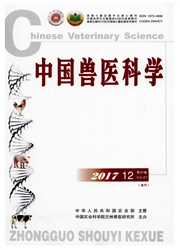

 中文摘要:
中文摘要:
选用6-8周Wistar大鼠40只,随机分为4组:对照组、原花青素(GSPE)组(200 mg/kg)、醋酸铅组(2.5 g/L)、醋酸铅+GSPE组,连续用药30 d。测定红细胞数量和血红蛋白浓度、肝功能指标、肝病理学变化、肝铅含量、抗氧化指标、细胞凋亡情况和血细胞DNA损伤程度,用于研究GSPE对铅诱导的大鼠肝损伤的保护作用。结果表明,GSPE会显著降低醋酸铅组大鼠肝丙氨酸转氨酶(ALT)和天冬氨酸转氨酶(AST)活性(P〈0.05),提高SOD酶活性(P〈0.05),降低脂质过氧化程度,显著改善铅诱导的肝病理损伤。TUNEL结果显示,铅会诱导肝细胞凋亡,GSPE可抑制这种凋亡。GSPE对铅诱导的DNA损伤具有保护作用并通过调控氧化应激、细胞凋亡和DNA损伤水平来保护铅诱导的肝损伤。
 英文摘要:
英文摘要:
In this research,the effect of grape seed proanthocyanidin extract on lead poisoning to rat liver was investigated. Forty adult male Wistar rats were randomly divided into four groups:control group,GSPE group,lead acetate group,and lead acetate+GSPE group ( rats received 200 mg/kg GSPE by oral garage administration for thirty days).The concentration of lead in the livers,the level of red blood cells and hemoglobin,biochemical analysis,liver pathological analysis,liver pathological change, DNA damage,apoptosis,and antioxidant indexes were determined. The results showed GSPE significantly attenuated the decreasing of ALT and AST (P〈0.05),oxidative stress,lipid peroxidation,apoptosis and DNA damage in the lead-induced rats. Compared with lead acetate group,the concentration of lead in the livers of lead acetate+GSPE group were not decreased. GSPE can protect livers against lead toxicity by regulating the level of oxidative stress,apoptosis and DNA damage.
 同期刊论文项目
同期刊论文项目
 同项目期刊论文
同项目期刊论文
 Effect of Short-Term Administration of Glucagon on Gene Expression of the Insulin Receptor in Primar
Effect of Short-Term Administration of Glucagon on Gene Expression of the Insulin Receptor in Primar Evaluation of The Difference of L-selectin, Tumor Necrosis Factor-? and Sialic Acid Concentration in
Evaluation of The Difference of L-selectin, Tumor Necrosis Factor-? and Sialic Acid Concentration in Resveratrol Protects against Arsenic Trioxide-Induced Nephrotoxicity by Facilitating Arsenic Metabol
Resveratrol Protects against Arsenic Trioxide-Induced Nephrotoxicity by Facilitating Arsenic Metabol 期刊信息
期刊信息
